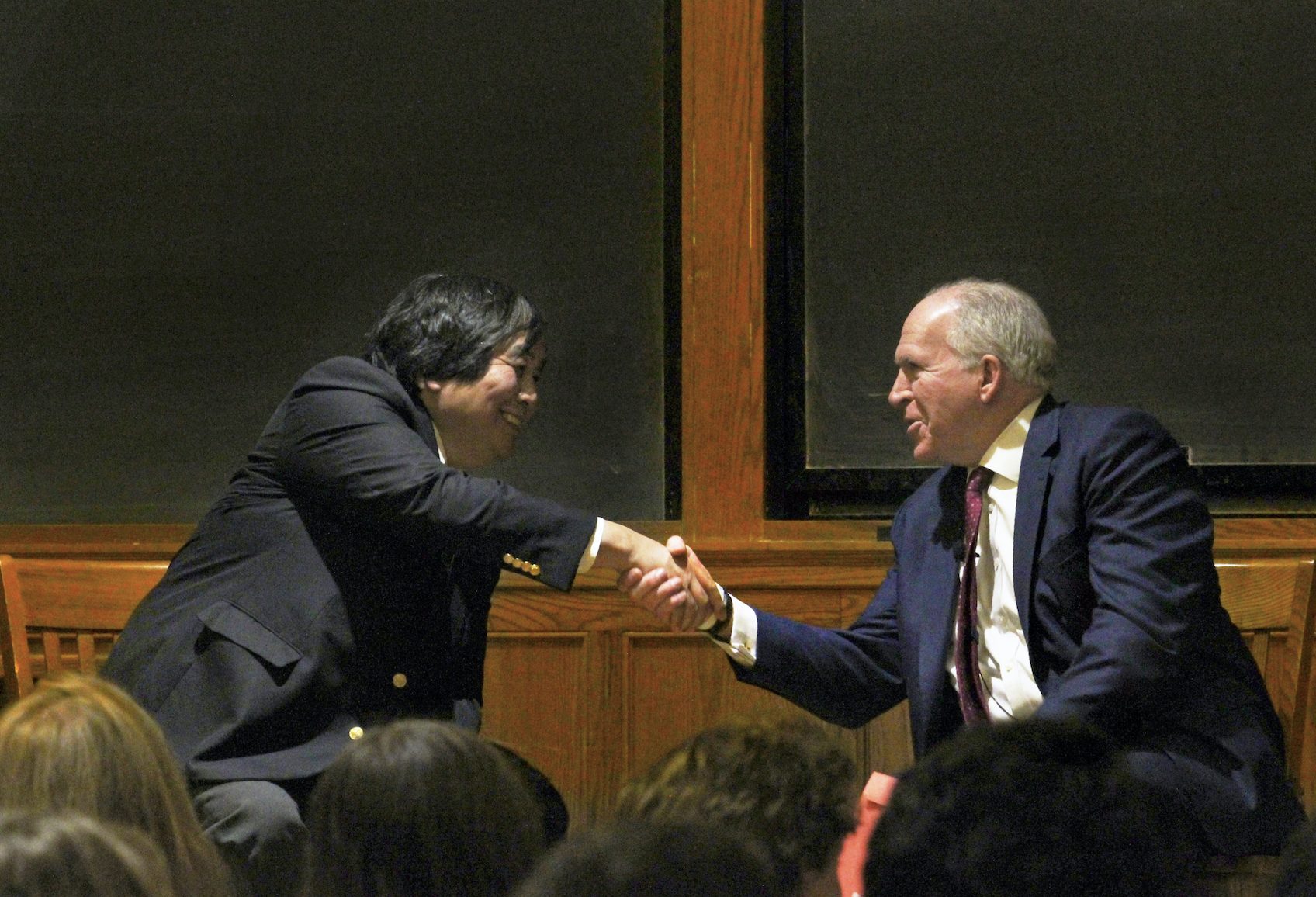
Former CIA Director John Brennan shared his insights on Russian interference in the 2016 U.S. presidential election, cybersecurity, counterterrorism and Middle Eastern conflict with a packed room at Linsly-Chittenden Hall on Wednesday evening.
The event, co-sponsored by The Politic and the Poynter Fellowship in Journalism, featured a conversation between Brennan and Harold Koh, Yale professor of international law who previously served as dean of the Law School and legal advisor to the U.S. State Department. A 15-minute Q&A session closed the discussion.
“He really devoted every ounce of his energy to protecting the country, but more fundamentally, to protecting its values,” Koh said while introducing Brennan.
The conversation began by offering a glimpse into Brennan’s background. The son of an Irish immigrant, Brennan grew up in New Jersey and earned his undergraduate degree at Fordham University. He proceeded to attend the University of Texas for graduate school, where he decided to apply for a position at the CIA. Brennan said he was motivated to serve his country through an intelligence career because of the sense of “American exceptionalism” that was instilled in him during his immigrant upbringing.
As the discussion turned to the topic of recent events, Brennan outlined the recent findings of the CIA, National Security Agency and FBI regarding Russian interference in the 2016 presidential election. When Koh asked how the intelligence community’s findings fit into Putin’s greater strategy, Brennan pointed to a trend of Russian engagement in European politics through electoral interference, exploitation of media contacts and presence in think tanks. American election interference was an extension of this trend, Brennan said, different only in terms of the “scope and intensity” of the campaign made possible by new digital tools.
Brennan described cybersecurity as the “most complex and challenging” issue that he has had to navigate in his intelligence career, citing the lack of clear guidelines as the biggest struggle in handling cybersecurity concerns.
“In 2016, we had to deal with this issue, and there was no playbook for it,” Brennan said.
He added that an independent commission formed by Congress and consisting of government officials and private sector experts, tasked with discussing the future of the internet and potential threats that accompany it, could be a good strategy to improve cybersecurity.
Brennan and Koh also discussed so-called “enhanced interrogation” techniques, including controversial methods such as waterboarding, which the CIA during the Bush administration.
Having served as CIA director after the Obama administration banned the techniques, Brennan said he opposed the readoption of any enhanced such practices.
“People asked me when I was Director of the CIA what would happen if the president of the United States directed me to reissue the waterboarding program,” Brennan said. “I said I’d say no. They asked if I’d resigned, and I said no, but the president would have to fire me because I would not ever allow any CIA officer to ever again engage in that type of practice.”
Still, Brennan said he thought the CIA was “unfairly maligned” for carrying out the techniques, given that the agency was following orders from the Bush administration.
In response to a question posed by Koh about how the United States’ relationship with North Korea has changed since Brennan left his position earlier this year, the former CIA director described the situation as the “fruition of decades of effort that North Korea has doggedly pursued,” and expressed concern about the public escalation of the conflict. He also condemned Trump and Kim Jong Un’s “barbs across the Twittersphere.”
Koh closed the session by asking Brennan what advice he had for Yale students about the roles they should play in the world.
“Think about what it is that you can do to give back to society.” Brennan said. “I would encourage each and every one of you to take advantage of the tremendous opportunities you have as Yale students, as American citizens, and as people who believe strongly in what this country is all about.”
Students interviewed after the event praised the way Brennan handled complex issues throughout the discussion. Attendee Aidan Campbell ’21 described Brennan’s approach as “especially interesting” in light of how he addressed delicate moral questions.
“The definition of torture has changed, and it did change during the Bush administration to justify some of the practices during that time, and I think he did a really good job of addressing it and making me understand the human component,” Campbell said.
Claire Kalikman ’21, who also attended the event, said she appreciated Brennan’s eloquence and liked that he was very honest about his positions.
Brennan served as CIA director from 2013 to 2017.
Asha Prihar | asha.prihar@yale.edu







